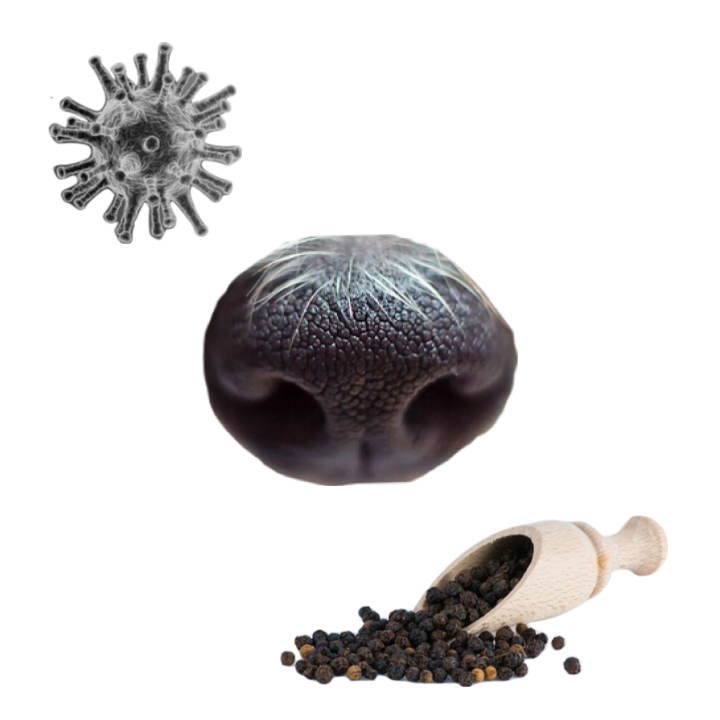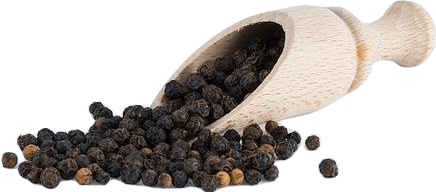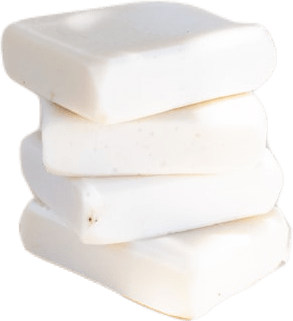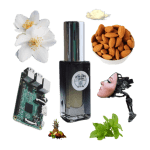The Other Smelly COVID-19 Symptom No One Talks About

At this point, we’ve all heard that many people lose their sense of smell for a period of time after contracting COVID-19. Known as anosmia, this condition often clears up within a few months, but in some cases can stick around long-term. Recently, articles have been emerging about other, lesser-known olfactory phenomena as well, like phantosmia and paranosmia.
So we know the coronavirus can affect your ability to smell. But what if it can also change the way you smell?
I got COVID-19 in October of 2022, an impressive two and a half years into the pandemic. Sure, I was always careful, obsessively keeping up with masking, handwashing, and vaccinations, and I’ve never been someone who goes out to parties and large gatherings much, but I was starting to feel a little bit invincible. Like maybe there was something about me genetically that made me one of those mysterious hold-outs. Like maybe it wasn’t actually going to get me.
And then I went to a hockey game. And was very sick for over a month after.
Like many fragrance enthusiasts, the star in the constellations of COVID symptoms I was most terrified of was losing my sense of smell in the long term. Thankfully, I didn’t experience this. While I was sick my sense of smell might have dulled some 10%, but I think that’s natural considering everything else my body was going through. But overall, my sense of smell has not changed.
What has changed, though, was the smell of me. Of my body. Of my sweat.
There’s no delicate way to put this. COVID made me stink way more than I did previously. It wasn’t just more of the smell of my sweat — it was the smell of a radically different sweat, as if off an entirely different person.
Pre-COVID, the smell of my sweat was light and peppery. Quiet. Faint. Oddly black-pepper-like. Nigh imperceptible. I could get away with wearing the same clothes for a week without them smelling like anything at all, save for accumulating traces of perfume.
Then I got sick. And all of a sudden, I needed to change clothes several times a day. I reeked horrifically of sweat that smelled nothing like my own, loud and putrescent and fruity, almost sweet, like overripe, half-fermented mushy apples.
Something about it felt very loud and very masculine, like I was some sort of gym bro instead of a small crocheted-fingerless-glove-wearing woman who can’t even do a single pull-up.
I can’t accurately express how strange it is to wake up and not smell like yourself.
It’s not that I was sweating more — although with the constant fever I had for weeks, that may well have been the case before I recovered. It’s that my sweat stunk, horrifically, like that of an antsy ultimate-frisbee-playing prepubescent boy.
And it wasn’t paranosmia, the experience of distorted smells, nor phantosmia, that of phantom smells, either. Everything else smelled just about the same as it did before, and my boyfriend has politely confirmed that I smell different.
Though it seems somewhat uncommon, I’m not the only one who has experienced and written about this phenomenon. Way back in July of 2020, Mic writer Joseph Lamour covered his experience of smelling different (and worse) after just a few months of quarantining. He attributes these changes to the lack of microbiome biodiversity available when isolated in one’s home from other people.
But it’s not just quarantining that does this. There have also been more recent articles about changes in body odor after COVID-19 infection.
Just two months ago, Lauren Mazzo of PopSugar reported smelling “like onions” at the first blush of sweat for the first month and a half after recovering from COVID. She points to several similar examples on forums and social media.
There’s even recent research on the matter. One study published in May found that “people infected with SARS-CoV-2, with asymptomatic or mild symptoms, have a distinct odor that can be identified by sensors and trained dogs with a high degree of accuracy.”
The Cognitive FX neurology clinic speculates that changes to body odor after COVID-19 infection are caused by changes to the function of the autonomic regulatory symptom (ANS). Specifically, a part of the ANS known as the sympathetic nervous system.
Usually, sweat mostly comes out of structures called the eccrine glands. But it’s possible that COVID-induced changes to the sympathetic nervous system stimulate sweating activity in the apocrine glands instead. Because apocrine gland sweat contains higher levels of proteins and fats, it usually has a much more pungent scent when bacteria break down these compounds on the skin.
So that’s the current theory. Getting sick messes with your nervous system in a way that leads you to sweat more through the smellier apocrine glands. That’s why some of us start smelling totally different after getting COVID-19.
Now, some three months later, I think my sweat glands are finally slowly returning to their original state. I still don’t smell like the same person I did a mere few months ago — it’s still less black pepper and more strange mushy half-fermented apple — but the new aroma is less pungent and strong, the volume subdued to something closer to my natural levels.
On me, the new sweat scent was aggressively prominent for the first two months, then gradually became more subdued. This is similar to the timelines reported by others, like Lauren.
Interestingly, none of my family members experienced this phenomenon when they got COVID, suggesting it’s not just genetics that decides whether a particular person experiences this symptom.
I’m incredibly relieved that I haven’t lost my sense of smell to the pandemic — or any other major form of functioning, or my life. But this certainly was a fascinating — and unexpected — smell-related phenomenon to experience. Human bodily odors are among the inspirations of many of the most famous perfumers. On the composition of the House of Guerlain’s classic Shalimar Eau de Parfum, perfumer Jacques Guerlain famously proclaimed that it should smell like “the underside of my mistress.”
Fiction has certainly explored this concept. The Perfume Collector by Kathleen Tessaro and Perfume: The Story of a Murderer by Patrick Süskind are two classic examples.
And then there’s the whole concept of skin chemistry. Numerous genetic and environmental factors (such as the recently-discovered human oxidation field) shape how fragrance materials express themselves on our skin. There is also recent work suggesting that certain genes can accurately predict what fragrance notes a person likes the most on themselves and others. This might be related to the particular scents innate to our bodies.
But it’s quite interesting what a range exists among the scents of human bodies. And it’s quite a jarring experience to have yours radically change.
This is a weird thing to be writing about. And this article probably won’t get far — understandably so, as algorithms have to be extremely careful about promoting anything COVID-related in the sea of Internet misinformation.
But it’s my drop in the online bucket of shared COVID-19 experiences. And I’m hoping maybe it will make someone out there feel a little less weird and gross when they get sick and suddenly smell incredibly pungently putrid and nothing like themselves.
Rest assured, dear stranger: you will probably go back to normal within a few months. For the time being, take showers, change clothes, enjoy fresh and clean-smelling fragrances, and take comfort in not being alone in this incredibly strange reaction to illness.
Have you experienced smell-related COVID symptoms? Was there ever a time you smelled radically different for some reason? I’d love to hear about it in the comments below!












My wife and I experienced this same thing! Unfortunately, 2 years later, we still have the smell seeping from our underarms. The reasoning makes sense too because it’s mainly present when we get nervous (ie. zoom calls), but our old BO smell never came back. This may just be our life lol.
So interesting! Sorry to hear you both experienced this, though. For me, six months later the stench isn’t nearly as loud as it used to be, but my sweat doesn’t smell the way it used to pre-COVID, and perhaps never will.
Yes, I’m now 10 months on in my long covid and from the time of my infection, my body odour – all over – has changed completely.
I liken it to vinegar but a Specialist asked me whether it smelled like “worn smelly gym socks tumbled around on a stick in charcoal”. Oddly specific.
I didn’t have a good night last night; shivers, tremors, sweats and headache. Woke this morning with full body tremors, and full body rancid smell. Yuk.
Mine reminded me of apple cider vinegar. Some sort of fermented overripe apple concoction. I was sick for about a month when I had COVID, and smelly for perhaps four months after. I’m sorry to hear you’ve been sick for long. I really hope things take a turn for the better soon and you’re able to get some rest.
I’m also having this onion smell, its nauseating, deoderant doesn’t seem to help…. I’ve had this for 2 years now since I had covid and the smell hasn’t gotten any better!
I had Covid in late August if 2021.. and i still have this rancid smelling sweat. It reminds me of strong buttered popcorn.. and it is nauseating.
It’s been 2yrs. Since I got Covid. And my body Oder smells like onions!’ And my bowel movements are so smelly I can’t describe it. I’ve tried everything I can think of but nothing helps. I’ve never had a smell on me like this before!!!
I have this happening right now as well its been 4.5 months for me. it’s awful.
I had the exact same experience then I came down with a autoimmune disease PMR and had to have my gallbladder removed my body odor has improved significantly since my surgery 5 days ago but my smell with food is off again
Yup, me too. 11 months later and I still stink. Oh well.
Yes, I had covid December of 2021 so its been 15 months. I didn’t have BO before covid, nor sweaty armpits. now, I smells like onions, and I dont even eat onions. I’m a vegitarian, mostly lettice, vegetables fruit and cheese, no onions…but smell like onions. Cant go without a shower more than a day…sometimes need to take a shower twice a day cause it make my skin feel sticky. YUK! My boyfriend who had it at the same time is complaining of the same disgusting smell. Is this a symptom of the Long Covid? Is there anyone who can provide research on this, and some thing to counteract it?
I was infected with covid late July of 2021. I did lose my sense of smell and taste. It was a mild case and my smell andtaste came back quickly. Srveral months after I noticed I smelled different and still do. Fermented, vinegary, onion smell. Very frustrating.
I’m glad it’s not just me. I had Covid 2021 and I do not smell the same at all. I smell like onions and garlic and I never eat them. My whole body smells different. Even my hair. I hate this!!!!
I was horrified to discover last week that I smell “off” and not so good after Long Covid from Dec 2022. My sense of smell has diminished and it’s reliability comes and goes. I’m so self conscious now and exploring natural remedies.
I got sick with covid 8 days ago. Today is Feb 21, 2024. Just got my sense of smell back and now I reek of onions even after just washing. I have smelled like this before but only in an extreme circumstances. Like a 15 hour day of flying around and taking depositions.
This is not good at all. Losing my sense of smell would be worse. Then I would not know when I stink.
This may have happened to me too. I got really sick during the pandemic for like two weeks with a fever (tested negative the whole time though) and I noticed my sweat smelled like cooked potatoes, and ever since then when I sweat a lot it smells like cooked potatoes. Before that sickness my sweat smelled totally normal. Thankfully my pits don’t stink, but it is weird to reek of cooked potatoes after an intense workout. I took some really strong antibiotics after that infection (because I also had a persistent throat infection at the time) so maybe they messed up my microbiome?
That’s really interesting! I’ve never heard cooked potatoes before. Lots of onions and garlic in this comments section, and mine was sort of like overripe fermenting apples and vinegar. I’m no expert, but the theory that microbiome has something to do with it makes perfect sense to me.
this happened to me to, i dont know if its since i had covid or if it was since i got my vaccine, but my armpits smell like onions, super strong smell, wasnt like this before. Some deodorants dont even work against it… 🙁 its been like a year already.. i dont know if there is a solution but i wish there was one, its really uncomfortable to smell like this
Just started mine, had covid a month ago, with really bad Fevers for a few days after now I have the stink.
I also have a strange body odor post COVID. I can smell myself just sitting in a chair, lying in bed or even walking. I’m not sweating either, it’s just an odor that I can smell and it actually smells like marijuana and no, I do not smoke it. I’m very self conscious about it and it does not go away. Showers, deodorant, nothing helps at all. I hate the way I smell now!
Hi Jarod
my sweat smells like marijuana too. and my poop smells really funky. ive never had these smells prior to covid. i do think its a long covid thing. also when my long covid was very bad, the smell was very bad. Now my long covid has almost gone, but I still have the stinky arm pits, and even after wearinG deodorant i cant wear a dress or top more than one day. Even in the winter. My poop is so chemically/funky that its embarrasing sometimes if I use a public loo.
I have experienced this for 2 years now. My personal conclusion (not sure if I’m right but it makes sense to me) has been that because I was so sick with COVID that I stayed in bed for 10 days and I lost my sense of smell so for those two reasons I didn’t shower that entire time. Because of this my microbiome in my pits changed and the result is gross sour smelling pits when previously I had no need to wear deodorant because my pits didn’t usually smell bad. I still don’t wear deodorant because I think it’s not healthy but I have found wiping the pits with vinegar to be helpful when needed,though that is just a temporary fix since I’m sure that also is not good for the microbiome. I am hoping to eventually fix it with a better diet for restoring microbiome.
I HAD IN JUNE 21 BEFORE VACCINES. I APPRECIATE ALL THE COMENTS. MY “CONEY ISLAND” ODOR WITH STRONG, FRESH ONION OVERTONES IS OVERWHELMING AT TIMES. IT SEEMS TO BE CONFINED TO UNDERARMS. DEODARANT SEEMS TO AMPLIFY THE ODOR. IT IS STILL PRESENT.
Has anyone developed new allergies along with the body odor? For me it’s tree nuts
I am so so glad to find that we are not alone!! My boyfriend had very mild COVID symptoms but it changed his chemistry. He has always been a sweater, like dripping wet… but he never smelled. Now his smell is just rancid. Especially when he sleep it the smell just seeps out of his entire body. I spray his bed almost daily to try and help that part, but we are lost how to help him. If anyone had any luck please let us know.
I have a similar story. I now smell like rotten or over ripe onions. History: Mild case of Covid May 2022. I pride myself in good hygiene habits and am also a diabetic. After Covid, I started sweating more and more to the point where I wore summer clothes in winter. Barely needed a winter coat. As the sweat worsened the smell got stronger. I tried everything to dull the smell. I thought it was from the diabetes medication. Reported to my physician and her comment was I just smelled like strong “BO”, however she changed my medicine. My sweating has drastically improved which has lessened the smell, but the smell is still there. In researching body Oder smelling like onions I read an article about bacteria on the skin smelling like onions and something about apple cider vinegar. Don’t laugh but I tried it and it works great for under the arms. I use a cotton pad soaked in the apple cider vinegar and rub under my arms. Once dry I don’t smell the apple cider vinegar. It keeps the smell at bay for 24 hours. I also switched to an antibacterial soap. Hope this helps others.
My sweet husband politely told me I smelled like a cross between garlic and a billy goat! Charming. It seems to come and go, but it’s been seven months.
Now it comes from my scalp too!
I have had covid several times and have been fully vaccinated as well. After the last bout of covid my right armpit in particular just plain stinks. It’s been 7 months since I had covid.I never used to need deodorant but now I have to wash under my arms several times a day. I actually found this post because I was looking online to see if other people experienced the same problem.
Sorry to hear you’re experiencing this too, Rhoda. My right armpit is worse too, probably because that’s my dominant hand, so I use that arm more. That might be the case for you as well. Hope this gets better for you soon.
That is so weird because that is what I am complaining about. I had Covid and I’ve gotten all the shots. I switched to Lume thinking it was the best out there for some reason it’s not working on my left arm pit. I don’t know what the smell is it’s just a stronger smell than I feel like I used to have before. There was a doctor on the news last night that explained why they’re saying when you get your next Covid shot it’s best to get it in the arm that you got it in before and he explained how it went into the lymph nodes in the armpit and then went into the blood and I started thinking about it, and I have mostly gotten them in my left arm and that’s the armpit that I’m having trouble with he said I’m not technical whatever was left there would be stronger when you got your next shot so it wasn’t just people saying it was better it it could actually be better to get it in the same arm. but maybe that is why I’m having trouble with my left arm. I wonder if you got your shot in your right arm
Since I got the COVID, every time I get sick that causes a fever, my body odor turns into a really weirdly sweet smell after the fever starts.It’s hard to describe the sweetness, it feels viscous, warm, mixed with some bitterness, and a little salty. But the smell is very uncomfortable. My original body odor is a bit like the water vapor. I can wear a piece of clothing for a week without any obvious body odor. But every time I have a fever the clothes I wear get that weird sweet smell and it’s hard to wash off.
I had a weirdly sweet, almost vinegary sweat smell after COVID too. I also used to be able to wear clothes for a week straight without any obvious smell! Thankfully now, around eight months after I got sick, I think it’s mostly gone away for me, or at least gotten much more faint. I can finally wear shirts for days on end again, as long as they’re tank tops with big arm holes where the fabric isn’t bunched right under my arms.
I had a similar experience(Covid 7-20) until recently that originated under my arms. Tried various bath soaps without any success. About six weeks ago I used my antibiotic hand soap and within two weeks the body odor had normalized. I used separate washcloths to wash and dry. Bacterial infection with which the body needed help???
Thanks for sharing what worked for you, Leila. At some point I tried applying a scrub with salicylic acid under my arms — I don’t remember what the rationale was, but I think I theorized somehow it would battle bacteria or something? I’m not sure whether it did anything. I think my body just normalized by itself and I’m now almost back to normal, but that took around nine months for me.
Thanks for this tip!
2 years after Covid, I Still smell very different. I contacted my doctor who was putting me in the smell disorder category. I did lose my sense of smell for a few months but it’s all gone back o normal now. My body odor or my farts are unrecognisable. I wonder how my wife hasn’t left me ! Obviously, I can live with it but it is the most weird thing to go through and I am still not used to my new smell and might never be !
Has the vaccine got to do anything with it ? Time will tell…
David H. – London (UK)
Not recognizing the way you smell is the weirdest experience. I hope this resolves for you soon, David!
I’ve been desperately looking for a reason why i smell like onions in my groins. I had never smelled like this before and it has taken a toll on my mental health. First I thought it was an infection but I didn’t had any other symptoms. And it’s been around 8 months. The smell was the worst at first 2 or 3 months but it is still present:( I don’t know what to do
Best of luck, Sara. Mine was also the worst for the first few months and it’s been eight or nine months for me now too – I don’t smell exactly how I did before, but I think I’m almost back to normal. I hope yours fades away soon!
this is crazy that I’m experiencing almost everything I’ve read in these comments. My body odor is so bad I can’t even get intimate or have fun and I’m only 22 !!! It’s been over a year 🙁
Such a relief to find these posts. I thought I was probably dying ( rotting) as both my sweat and my poo smell weird and unpleasant. I am embarrassed about both but at least I understand now that it’s COVID related. I’ve not isolated what the smell is but will try antibacterial soap ( as suggested) and shower twice a day. Thank you all for sharing your sweat stories.
Hi! I am so relieved I am not alone in this. A friend told me after Covid she developed a really bad smell. I couldn’t relate at that point but since then I’ve had Covid 2 more times and my awful smelly body seems to be getting worse. It’s not just my armpits either. It’s just gross. I will be trying an antibacterial soap. That was good advice. It’s embarrassing but don’t know how I smell to others. Help!
Oh wow, it’s so good to normalise my weird post Covid body odour! It’s coming up to two years since I first had Covid and my armpits and groin both smell like sweet rotting apples mixed with vinegar. Delightful! It’s such a strange sensation not to recognise your own smell. And don’t even get me started on my farts and bowel movements. Is it odd to miss my old body odours so much?!
SAME DANNI SAME :((
Apparently, and I’m only guessing at this, I suffer from this, but with a worse smell. I can’t smell it (not a post-covid symptom, as I can smell other things just fine), but apparently it smells like sweaty crotch, and it smells bad. I haven’t changed my lifestyle or diet, so I am at a loss and am desperate.
My armpits stink so bad. I don’t know whether to attribute it to the vaccines or the time I tested positive for Covid with very mild symptoms. I used to love the way I smelled. It was pleasant and smelled like me. Now I reek all the time. Armpits smell like fajitas, onions and a smelly compist bin. Soap, showering doesn’t make it go away. I smell it in the shower. So gross. I just want it to go away. So glad I found this and others are suffering too.
Yes, exactly. My armpits are oily and smell like when my wife makes Fajitas! It doesn’t scrub off .
I’ve resorted to using a baby wipe preshower to cut thru the thick oil. Then wash under arms repeatedly. Still smells like onions, fajita seasoning mix.
“Luckily” I’m and old fart and no one gets all that close to me so it hasn’t really been a issue besides my own discomfort with it.
My case is slightly different. I never had covid, not that I know of. But my sense of smell started to change over the last few months and what I used to love – onions fresh or cooked – became my nightmare smell. I can smell onions in the salad that waiter brings to the table, I can smell any food that contains onions. And I also smell an old onion coming from on my own pits. I am predominantly plant-based pescatarian and I always have had a very light smell since changed to this diet. I don’t smell it all the time, only when my pits get sweaty or there are onions around. My family says that the food smells normal, while I can’t eat it anymore. Not sure how to deal with this or what’s changed. I’ll post if I figure out what it is.
My husband and I had COVID for the first time a few weeks ago. His body odor has changed drastically. I didn’t know if my sense of smell changed or his odor.
I am experiencing the same thing and I found this article from Google search. I am male 27. Before this, my body odor was non-existent and I know this because I have always taken pride of this fact that I never smell like my male or female friends, like at all. It was a blessing. However, I got Covid 5 days ago and my body odor has became really disgusting that I am so shocked and sad. I too didn’t lose sense of smell or taste or anything. I am so glad to learn that this isn’t permanent. Thank you so much!
I have been looking for something like this for a while. I honestly thought that I was the only one going through this. My BO has changed so much since having COVID for the first time (Jan. 2021). I thought that it was from the plasma I received, because to me that’s what it smells like. I am constantly self-conscious of my BO and shower and change clothing at least 3 times daily. Any time I sweat I am heading straight to the shower.
Same Tye omg!!!! This is the worst thing ever omg… I thought I was alone with this issue !
Hello just found this post, I am still going through Long Covid loss of taste etc, but I too have body odour which am conscience off, smelly armpits mainly any suggestions xx
I have had Covid twice in the last three years and since having it, I have noticed that my sweat glands particularly in my armpits and my private area all release an odor/smell like garlic most of the times and every now and then onions. Me and a coworker were talking today and we agreed that it resembled vegetable soup. This body odor has caused me to switch jobs where I’m no where near a human being just because of the potential embarrassment this may cause. I smell myself when I haven’t even sweated yet. I notice it more when I’m anxious/stressed. NOTHING WORKS!!!! I have tried EVERY deodorant known. I have used both men and women’s products. I’ve since tried Lume and it seemed to work for a while but now DOES NOT. I wish there was an answer for this with a guaranteed solution because this affects me mentally, emotionally, and sexually. Glad to know I’m not crazy and am not the only one but this sucks.
this literally affects everything you have listed !!! Omg this is crazy that it’s so many of us yet there is no solution!!!!!! It’s been over a year !!!!!
I relate to almost everything in these comments and it’s the worst thing I have possibly experienced. It literally affects my whole life . My body odor is insane everything on my body doesn’t stay smelling fresh after a short amount of time even my breath !!!!
Also since having covid I’ve experienced brain fog! I’ll say something and forget what I just said and I’ll think really hard and get frustrated because it just won’t come back to me ! My memory is so horrible now 🙁 we need to make a Facebook or Instagram group so we can discuss and hopefully one of us finds a solution to help eachother out!
I know now im not insane for thinking I smell like a sweaty pineapple. I had covid 2 yrs ago and still have wierd taste and smell. This confirms I’m not crazy. I’m checking into a treatment at Cleveland clinic that is finding cure thru injection into a ball of nerves in the neck. It’s almost like a reboot….google this if you’re interested.
How do I find it ? I’m interested !
I went through this the first time i had COVID, real covid, and recently again when i got the summer 2023 version which was just a two day head cold. Instantly my BO returned to the teenage boy onion smell. After the first covid experience it took almost 1.5 years to fade. This time it seems to me fading faster. Maybe it is proportional to the severity of the symptoms. Ever medical person i mention this to thinks i’m crazy.
Ditto on health care providers being ZERO helpful or concerned about it .
I went through this the first time i had COVID, real covid, and recently again when i got the summer 2023 version which was just a two day head cold. Instantly my BO returned to the teenage boy onion smell. After the first covid experience it took almost 1.5 years to fade. This time it seems to me fading faster. Maybe it is proportional to the severity of the symptoms. Ever medical person i mention this to thinks i’m crazy.
No onion smell but I noticed a few hours after covid vaccinations my skin smelled odd, not a bad smell just different and not a smell I recognise or is similar to anything else. I can smell it on my hands, arms, inside my nose etc. Everything else smells completely normal and I have no loss of smell. The smell goes after 24hrs or so and is accompanied by extreme tiredness. Since vaccinations I’ve had the same smell approx 3 times in 2 years and have speculated that I may have been infected with covid. Just had it again after being in close contact with someone who tested positive for covid. Anyone else?
hi there. thanks for sharing… i had covid with the three symptoms being loss of smell and taste and fatigue… that was three years ago and today… my BO is disgusting and also the change of my pee smell … it has never gone back to a neutral smell… so weird.
I had covid dec 2019- long haul covid – with symptoms described in this thread, plus losing hair. Then I had covid last month and the smells are embarrassing- and if I try to do any house work like load the dishes I break out in this clammy sweat on my head and neck. Not sure we’ll ever understand all the repercussions of this horrible disease. I’ve switched deodorant and use baby wiped for down there but am still odiferous. Ugh!
My wife and i had covid pretty bad (i was off work 3 weeks) in Sept 2021 and totally, completely lost my sense of smell. Slowly, ever so slowly it began returning, for the most part. Some things i still cannot smell like Basil. And some things smell different, especially shampoo, which now smells terrible. weird huh? But for months i could not smell any smells produced by my body, or anyone elses. Starting about 3 months ago, i began noticing my underarms stunk. BAD. kind of like strong rotten onions, or something. I had never used anti-perspirant but i had to start because i just smell absolutely atrocious. My wife can smell it to. It’s funny though, she has no b/o. But she is japanese, i am white. i read that koreans and japanese don’t have b/o because of genetics. maybe it is something to do with the apocrine glands after covid making me smell so radically different and stinkier. Hopefully this will go away but it is somewhat comforting to know that others have this issue.
Very interesting, similar experience. My sense of smell is was the first indication I had COVID November 21. When I went outside there was this strong smell of mice urine . My COVID lasted two weeks, my wife one. My underarms stink and sense of smell still off 2 years later. Oddly wife while white was born and spent several years growing up in Indonesia.
I had Covid August 2023. Am 76, female. I noticed different body odor sometime during first week. I still have it but not as strong. I have not been able to describe the smell. I had low grade fever for about four weeks. Thought it might go away when fever left but it is still around but not as strong. Glad to hear input. But I had researched it before this article.
Thank you so much for publishing this. I made it to Nov 2023 before getting covid. I am only 2 weeks out but the body odor has been driving me crazy. I thought maybe it was due to the medication, I was given paxlovid, but that should be gone and I still stink. I googled it looking for answers and found your story. It helps to know its not just me.
I’m so glad I found this article! I knew I smelled different. I did not lose my sense of smell with COVID, but it would sure be handy now! Lol! It’s been almost a year and a half and I still smell different. I’m not complaining, my husband’s bout with COVID caused him to get ALS and because of COVID it took only a year to go through what should have taken three to five years. He passed away on July 13th 2023…
Has anyone created a group for thi yet??? We need solutions!
It’s comforting knowing that I’m not alone in this. I had Covid for 4 weeks in March 2021. The disgusting smell under my arms didn’t start till about a year later. It smells like Chinese food. Has anyone else experienced the Chinese food odor? Sometimes Lume works and sometimes it doesn’t. Ugh!
Omg!!! Me!!! I keep saying my arm pits sweat smells like fried noodles for a month now. Had covid in September 2023 and lost smell and taste for weeks. I still can’t fully get the scent of most things. Not my sweat though, I started to reek of fried noodles like two months after covid…
# Me Too. I just got covid for the first time Nov 3, 2023. I got hit hard and took Paxlovid three days in. lost my sense of smell on day two and ironically panicked about that lasting BECAUSE I am obsessive about bodily smells and horrified when I have bad breath or BO. Well- maybe I wished for the wring thing because the way I know I got my smell back is because I weirdly smell like onions and showers don’t help! I guess I should just be glad that I CAN still be horrified by smelling bad!
So glad to find this article and all of you! I made it to Sept ’23 before getting COVID, and it was relatively mild I guess, though it sure felt like yuck at the time! My sense of smell wasn’t really effected but I did have a fever over 100 for about a day, and it was the fever sweats that I first noticed being so bad. It’s been 2 months now and it’s still hanging around – a much more biting smell than I had before. I won’t tell you how many times I’ve sniffed my pits while reading down this page but yeah, onions is pretty accurate. I live alone and work from home, but I definitely take much more care to put on deodorant and change my shirt before leaving the house! It’s too bad nobody really has a good solution, and I’m sure sorry to read some of your stories who have had much more of an impact on different areas of your life. For me, it’s more of the “weird and slightly irritating” level, but I do appreciate knowing that this is really a thing because I was starting to feel a little crazy. Thanks for sharing!!
Yes , thank you for this article !
I am convinced my body odor has changed since Covid. The odor seems to come and go. I feel like it is the disease itself that I am smelling. It’s quite disturbing and makes me wonder if I am infected with the virus every time I smell it.
I had Covid in Oct of 2021. I smell like onions when I sweat. It’s awful! I’ve had my mom take a whiff just to be sure that maybe my smell isn’t just off… she smelled it too, onions. Ugh.
I’m so glad I googled this topic because after having covid a couple of weeks ago I smell awful bad. I feel my smell is like stress sweat smell and is primarily around my neck and under beasts while my armpits seem okay still. It’s driving me crazy and I’m aware of it at all times.
I also have been experiencing hot flash like spells during covid and while improving it is still occurring making me sweat profusely and frequently which is really not helping.
I rely on a personal support worker to help me bathe and wish she came every day not just a few times a week! I hate this but feel better now I know I’m not going crazy, I really do stink but at least I know I’m not alone in this. Hope it goes away soon, I’m offending even myself.
Just getting through Covid and was questioning if the fever had suddenly made me,breath, BO and clithing/bedclothes smell bad, and I find this. I don’t think I’ve lost my sense of taste though the banana tasted different, while I could still smell banana.
I am sitting here in tears reading ALL the post…I thought I was loosing it. I was infected with Covid 2 years age, I lost my sense of smell and tase, that’s it. I had no fever, cough nothing else. Today I can only taste the sugar in things, but cannot identify what it is. The only thing that I can smell is my BO and it is BAD. I really don’t want to be around people.
Seriously experiencing this exact thing. It happened right after I got my first Covid shot and I was absolutely grossed out with myself even though I’m the cleanest person I know and now years later in December 2023 the smell is coming back out of nowhere?!
Thank you! My body odor since my 2nd round of Covid (3/23) is absolutely disgusting. My pits radiate a rotten onion smell that has made me quite uncomfortable. I googled articles about this because it’s just been since I had Covid. So thankful to know I’m not alone! For months after my 1st round, I couldn’t smell any body odor but now, I smell terrible. I can’t stand the smell.
This is my second round of covid. had for 2wks. first round 2 yrs. ago for 2 mo. armpits have smelled like onions ever since . Baking soda helps for a little while. I tried castor oil this morning, they say it helps everything. we will see. I am at my wits end.There has to be a cure for this.. I love that I found this sight. Good luck to all battling this problem…
I was hospitalized with severe COVID 2.5 yrs ago and my #2 and body odors and some taste/smells have never gotten any better. And now the under arm sweat? I mean wow…never before was I mr. Onion but now? Ever since ..terrible… More and more symptoms I find of long COVID woes .m
I was so happy to run into this blog because I, too, have smelly sweat, pee and poo. It is not that my ability to smell is off but that what is coming out of my body has a horrible smell. I know it is coming from my body because the armpit in a t-shirt will have the terrible smell (very well described by folks here) but the rest to the t-shirt will smell clean. This comes and goes as well. The good thing is that my husband has a horrible sense of smell and does not smell it but I have a great sense of smell and find it disgusting. I recently started HBOT (hyperbaric oxygen therapy) for Long Covid — its very expensive but I am pretty desperate to get well. After the first session the smell was very intense. So the therapy is obviously doing something.
Have COVID.. this article is a bit reassuring of what I am going through now 🙂
Thanks for taking time to share your experience… bless you. ciao
Thank you for posting your article. I too have a change in skin odor that at first I could smell it around myself but could not find the source. I started to realize it could be me so several times a day changing my clothes and still could smell this foreign smell. I bought a body soap with mint scents and it help for a hour or so then came back. I even wash my hair in this concoction. The smell was not the usual areas to have body odor. It was from either my scalp and skin. I asked my doctor today about what it could be and when he learned I just got over covid when this smell appeared it must be a result of covid changing my body neurologically. I hope this smell goes away one day but until then I continue to try and tame this scent. I can not describe it but to think heavy and musky and sweet and rotten. Thank you again for I am not alone in this strange side effect.